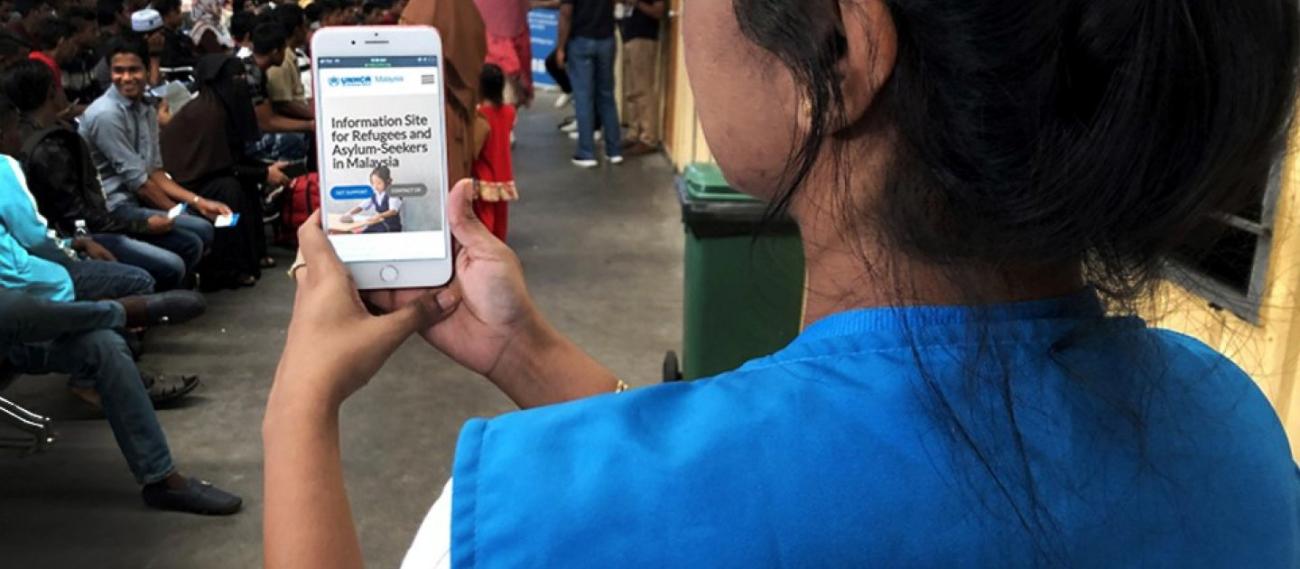Making Information Accessible To Refugees In A Time Of Crisis

Browsing the Refugee-Malaysia.org from a mobile phone
Ceu, an ethnic Chin refugee from Myanmar, is the coordinator of a refugee group in Malaysia, the Chin Refugee Committee. His job has become all the more hectic right now following the outbreak of Covid-19 in Malaysia.
“During this period especially, information is necessary for the community,” said Ceu. “Usually, I will go and find the information from UNHCR during meetings or I will call to get the information I need, but now I get it from your website.”
Ceu is referring to the newly launched Refugee-Malaysia.org information portal set up by UNHCR, the UN Refugee Agency in Malaysia.
“The Refugee-Malaysia.org information portal aims to help refugees and asylum-seekers have easy access to information on protection and assistance in Malaysia,” said Thomas Albrecht, UNHCR Representative.
“This portal may also be useful for individuals and civil society organisations who are working with refugees to download resources and information that may be of use to the communities they serve.”
For refugees like Ceu, it enables access to information at any time, without needing to travel to the UNHCR office or calling UNHCR staff members.
“I look at it every day. I look for any information on Covid-19, especially about Government movement controls. Whatever I think will be useful to my community, I will download it and share,” said Ceu.
Ceu is not the only refugee leader who has found the portal useful. In a survey conducted by UNHCR with teachers from 108 refugee learning centres, over 77% of teachers frequented the site for the information they needed. Almost all of the teachers found the site very useful, and the majority downloaded the information to be distributed to students and their families.
The Refugee-Malaysia.org information portal launched its pilot phase earlier this year, primarily with basic information such as on health and education services, and mostly in English.
However, content on the site has increased significantly in recent months following the outbreak of the Covid-19 infection in the country.
“When we launched the portal, we explained to refugees and partners that the site would continuously be updated and improved to meet their needs,” said Albrecht.
“Since the start of the Covid-19 outbreak, our teams have worked hard to upload information on the portal for refugees and organisations supporting refugees on where to obtain help and services, quickly and in languages that refugees understand.
“As a next step, we are also working on producing audio content in different languages for communities who are unable to read.”
The Refugee-Malaysia.org information portal today includes information on Covid-19 prevention, treatment, and testing, advisories on the Government’s Movement Control Order, as well as the list of Covid-19 Hotlines in Burmese, Chin, Rohingya, Persian, Tamil, Urdu, Arabic, and Somali languages.
The information portal aims to complement existing efforts in reaching out to refugee communities such as through community meetings, phone calls, and distribution of physical information materials which are bound by geographical limitations and are resource-intensive.
“The Refugee-Malaysia.org site is not intended to replace all other methods of communicating with communities, including community meetings where refugees can speak to UNHCR teams face to face,” said Albrecht.
“However, we must acknowledge that allowing refugees to have access to information on their own when they need it, will help empower and strengthen these communities. It reduces their dependency on UNHCR, NGOs, or community leaders for information. It puts some control back into the hands of refugee individuals.”
Access the information portal at refugee-malaysia.org



